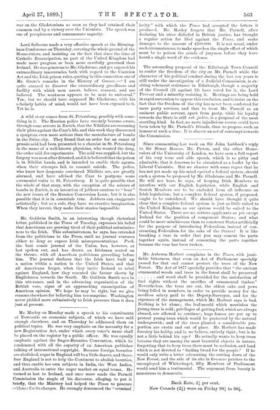Mr. Morley on Monday made a speech to his constituents
at Newcastle on economic subjects, of which we have said enough elsewhere, and on Thursday he addressed them on political topics. He was very emphatic on the necessity for a new Registration Act, under which every voter's name shall he placed on the register by a public officer. He was equally emphatic against the Sugar-Bounties Convention, which he condemned with all the asperity of an American publisher talking of international copyright. Because foreign bounties are abolished, sugar in England will be a little dearer, and there- fore England is not to help the Continent to abolish bounties, and thus enable her own subjects in India, the West Indies, and Australia to enter the sugar market on equal terms. He turned at last to Ireland, and once more made the Parnell Commission the staple of his discourse, alleging, to put it briefly, that the Ministry had helped the Times to procure evidence for its charges. He strongly denounced the "criminal levity" with which the Times had accepted the letters it produced. Mr. Morley forgets that Mr. Parnell, after declaring his utter disbelief in British justice, has brought a regular action for libel against the Times, and seeks damages to the amount of £100,000. It is not usual, under such circumstances, to make speeches the single effect of which must be to poison the minds of jurymen before they have heard a single word of the evidence.


































 Previous page
Previous page